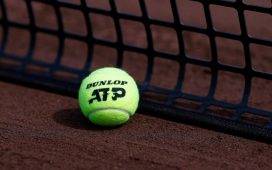In the fallout from Naomi Osaka’s French Open walkout, everyone seemed to fall out with everyone else. I got a text from a TV producer. “Lol. Piers Morgan’s criticism of the tennis player not wanting to attend a press conference is rich given 99% of the TV presenters I’ve EVER worked with (usually male, including you) won’t attend debriefs and cry like babies if you dare say they didn’t have a great show. The male TV presenter is the most fragile ego in all showbiz.” And this is from a close friend, please note; imagine what I get from my enemies.
He makes a fair point. A debrief, a post-show meeting for a full and frank exchange of views, is on the face of it a good idea. You look at what’s gone well, what hasn’t, and what can be learned for next time. The trouble is, straight after coming off air, the heroes and villains of the hour are rarely in the right emotional place for constructive reflection. It can often turn into an orgy of cloying self-congratulation or, more often, an exercise in arse-covering. The blame for anything that’s gone wrong is parcelled up and passed around the room and everyone endeavours not to be holding it when the music stops. And, yes, I must admit I have often inwardly cried like a baby when anyone dares to say, or even merely intimate, that I haven’t had a great show.
I’m not for one minute comparing any of this to a post-match press conference. Apart from anything else, a debrief obviously isn’t televised; only a handful of people are privy to it. While it can be horrible, it is as nothing compared to having just lost a match and then, straight off court, being obliged to subject yourself to a public inquisition as to the nature of your shortcomings for the benefit of a global audience.
Whatever you do for a living, or whatever you do outside work, you will doubtless have key encounters or events in your life – with colleagues, friends, family or whoever – during which important stuff happens in a stressful passage of play. Now imagine, straight after one of these dramas, walking into a room full of people asking you questions about it for broadcast around the world. It’s unthinkable to most of us. Yes, I know athletes get paid a mint, need the media as much as the media needs them and so on, but I wouldn’t blame any of them for loathing post-match interviews. Talk later by all means, after you’ve produced your urine sample and settled your mind and body down. But not there and then while your pulse is still racing and you’re not quite sure about anything other than you’re either happy, or utterly hacked off.
In individual sports such as tennis, it must be especially difficult. In a team sport like football, you can, if only by implication, shift blame – or credit – on to others. You can also, importantly, bemoan a bit of rotten bad luck. In tennis, luck hardly comes into it; it’s all your fault. Only you. Thanks to Hawk-Eye you can’t even blame a line-judge.
The irony here is that these things, as well as being brutal, are brutally boring – utterly pointless and invariably content-free. What purpose can they serve when you know almost word for word what is going to be said? Try it: after the next football match you watch, write down what you think the winning and losing managers and players will have to say. I promise, you won’t be far off.
Who is it all for? The players don’t like doing post-match interviews; as a fan I have scant interest in them, and I’m not even sure journalists much relish them. Yes, space must be filled, but all in all this pile-on atop a tennis player resembles bald men fighting over a comb. Heat-of-the-moment interviews could be banned completely and no one who mattered would miss them.
Anyway, thanks for reading these words. I’m just imagining how awful it would be if I was now obliged to be questioned about them by a group of journalists in a forum broadcast live for anyone in the world to watch. No thanks.








